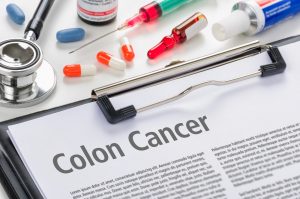Written by Taylor Woosley, Staff Writer. Findings from a genome-wide interaction analysis using data from 51 studies shows that an inverse association was noted between dietary folate, total folate, and folic acid supplementation and colorectal cancer.
 Colorectal cancer (CRC) is the third most common cancer and the second most common cause of cancer-related death globally1. Genetic, environmental, and lifestyle factors such as diet play a major role in the pathogenesis of CRC2. Comprehensive genomic profiling of CRC has revealed significant intratumoral and intertumoral heterogeneity through the accumulation of genetic mutations during disease onset and progression3.
Colorectal cancer (CRC) is the third most common cancer and the second most common cause of cancer-related death globally1. Genetic, environmental, and lifestyle factors such as diet play a major role in the pathogenesis of CRC2. Comprehensive genomic profiling of CRC has revealed significant intratumoral and intertumoral heterogeneity through the accumulation of genetic mutations during disease onset and progression3.
Folate, an essential B vitamin for DNA methylation, synthesis, and repair, has been extensively researched with CRC4. Folate and folic acid play a crucial role in one-carbon metabolism, which is a complex series of biochemical reactions to controlling processes determining DNA integrity, which has been known to be linked to tumor growth5. Variations in genes related to folate-mediated one carbon metabolism (FOCM), such as MTHFR and DHRF, as well as potential genetic predisposition for CRC recurrence and survival, require further investigation6.
Bouras et al. performed a genome-wide interaction analysis to identify single nucleotide polymorphisms (SNPs) that may potentially modify the effects of dietary and total folate and folic acid supplementation on CRC risk. The analysis featured data from 51 studies (n = 30,550 cases; n = 42,336 controls) contributing to 3 consortia – the multicentered Colon Cancer Family Registry (CCFR), the Genetics and Epidemiology of Colorectal Cancer Consortium (GECCO), and the Colorectal Transdisciplinary Study (CORECT). Cases were included if they were colorectal adenocarcinoma or advanced adenomas confirmed by medical records.
A combination of interviews and questionnaires were utilized to obtain information regarding demographics and environmental risk factors. Dietary folate intake was estimated based on food frequency questionnaires or available diet history, with folate and folic acid being determined based on micrograms per day from foods or supplements. Genotype analysis was limited to participants with European ancestry as identified through self-reported race and principal components clustering with 1000 Genomes EUR super-populations. Adjusted logistic regression models were used to evaluate study-specific associations of folate on CRC outcomes. Stratified analyses were performed by levels of alcohol intake and years to CRC diagnosis. Significant findings of the study are as follows:
- Pooled analysis results show that an inverse association was observed between dietary folate and CRC. The association was stronger in males than females (P-heterogeneity = 0.02) and marginally stronger among ever drinkers compared with never drinkers (P-heterogeneity = 0.08).
- Furthermore, pooled analysis findings show that total folate was inversely associated with CRC, with a stronger association noted in male subjects than female (P-heterogeneity = 0.01).
- An inverse association was found for folic acid supplementation and CRC. An interaction was observed in the standard GxE analysis between folic acid supplement and variants in the 3p25.2 locus, near the Synapsin II/tissue inhibitor of metalloproteinase 4 region, with rs150924902 being the variant with the strongest interaction.
- Findings of the stratified analysis of folic acid supplementation and CRC by genotypes of rs150924902 show an inverse association amongst the TT genotype and positive among those with the TA genotype.
Results of the study featuring data from 51 studies with 30,550 cases and 42,336 controls show that an inverse association was found between folate and CRC risk. Further research should continue to explore the potential protective benefits of folate on CRC risk. Study limitations include lack of further folate measurements beyond the single measurement used and only including analysis of participants with European ancestry which limits the generalizability of findings.
Source: Bouras, Emmanouil, Andre E. Kim, Yi Lin, John Morrison, Mengmeng Du, Demetrius Albanes, Elizabeth L. Barry et al. “Genome-wide interaction analysis of folate for colorectal cancer risk.” The American Journal of Clinical Nutrition 118, no. 5 (2023): 881-891.
© 2023 The Author(s). Published by Elsevier Inc. on behalf of American Society for Nutrition. This is an open access article under the CC BY license (http://
creativecommons.org/licenses/by/4.0/).
Click here to read the full text study.
Posted January 24, 2024.
Taylor Woosley studied biology at Purdue University before becoming a 2016 graduate of Columbia College Chicago with a major in Writing. She currently resides in Glen Ellyn, IL.
References:
- Shin AE, Giancotti FG, Rustgi AK. Metastatic colorectal cancer: mechanisms and emerging therapeutics. Trends Pharmacol Sci. Apr 2023;44(4):222-236. doi:10.1016/j.tips.2023.01.003
- Thanikachalam K, Khan G. Colorectal Cancer and Nutrition. Nutrients. Jan 14 2019;11(1)doi:10.3390/nu11010164
- Li J, Ma X, Chakravarti D, Shalapour S, DePinho RA. Genetic and biological hallmarks of colorectal cancer. Genes & development. Jun 2021;35(11-12):787-820. doi:10.1101/gad.348226.120
- Wang F, Wu K, Li Y, et al. Association of folate intake and colorectal cancer risk in the postfortification era in US women. Am J Clin Nutr. Jul 1 2021;114(1):49-58. doi:10.1093/ajcn/nqab035
- Gigic B, van Roekel E, Holowatyj AN, et al. Cohort profile: Biomarkers related to folate-dependent one-carbon metabolism in colorectal cancer recurrence and survival – the FOCUS Consortium. BMJ Open. Dec 22 2022;12(12):e062930. doi:10.1136/bmjopen-2022-062930
- Geijsen A, Ulvik A, Gigic B, et al. Circulating Folate and Folic Acid Concentrations: Associations With Colorectal Cancer Recurrence and Survival. JNCI Cancer Spectr. Oct 2020;4(5):pkaa051. doi:10.1093/jncics/pkaa051
